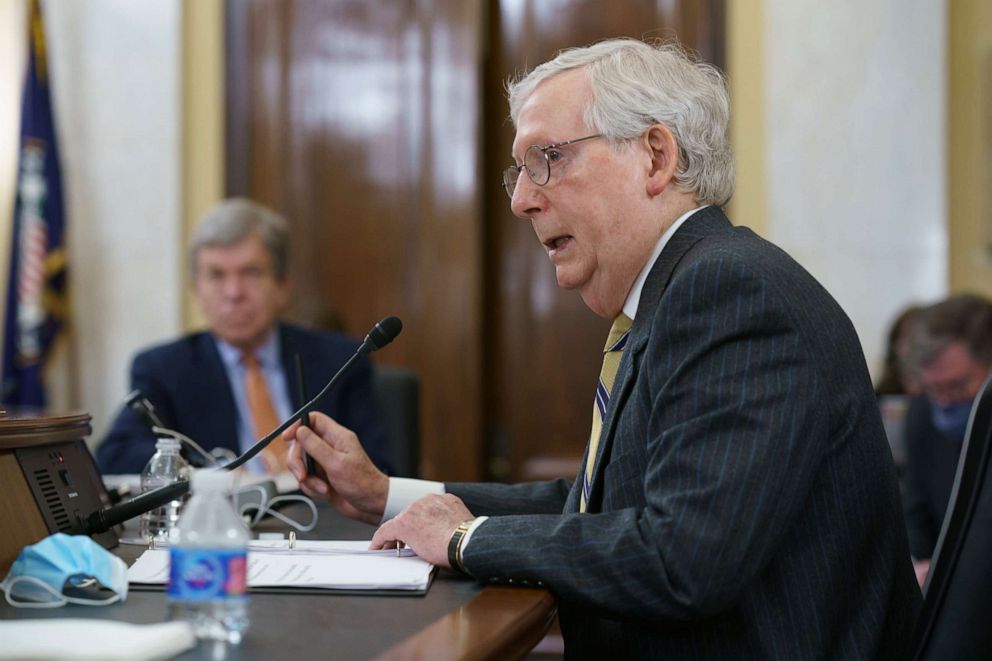Senate Democrats move forward with voting rights bill despite Republican opposition
Senate Democrats Wednesday began their march forward on a sweeping voting rights bill, convening a hearing on their "top priority" legislation despite Republican efforts to cast the bill as a Democratic power grab.
The For the People Act aims to make major election reforms that lower barriers to voting, including automatic voter registration, requiring voter registration on the day of an election and reforms to gerrymandering and campaign finance laws.
Senate Majority Leader Chuck Schumer has already committed to bringing the bill, a version of which passed the House along partisan lines earlier this year, to a vote on the Senate floor and made a rare committee appearance Wednesday urging the Senate to act swiftly.
He said some of the state laws that the For the People Act aims to beat back "smack of Jim Crow rearing its ugly head once again" and argued that was a primary reason that the Senate needs to act.
"If we don't stop these vicious and often racist actions, third world autocracy will be on its way," Schumer said.
Democrats have argued there is an increased urgency to passing voting protections as statehouses across the country consider legislation that would restrict access to the polls.
The Brennan Center for Justice, a nonpartisan, independent organization that analyzes election rules, found that state lawmakers had filed 253 bills with provisions that restrict voting access in 43 states as of last month.
"I would like to ask my Republican colleagues, why are you so afraid of Democracy?" Schumer said. "Why, instead of trying to win over voters that you lost in the last election are you trying to prevent them from voting?"
But Republican Leader Mitch McConnell, who was also present at Wednesday hearing, has been unapologetic about his opposition to the bill. He predicted Wednesday that his entire conference would oppose it if it came to a vote.
Republicans take several issues with the nearly 800-page piece of legislation, including that expanding voting rights will hurt their party in future elections.
They claim that Democrats are seizing on their slim Senate majority to pass measures that would make it easier for them to remain in power and point to language that would change the composition of the Federal Election Commission to make it a more partisan body, as well as measures that would take power to run elections away from states.
"This is a solution in search of problem," McConnell said. "States are not engaging in trying to suppress voters whatsoever. This is clearly an effort by one party to rewrite the rules of our political system."

The near-even partisan split on the voting rights bill could rapidly escalate the ongoing debate over the Senate filibuster. As it stands, nearly every Democrat in the chamber, except for West Virginian Democrat Joe Manchin, supports the voting rights bill. But 60 votes are currently needed in the Senate to end debate and pass legislation, meaning Democrats need support from at least 10 Republicans to advance bills through the 50-50 Senate.
Many Democrats, worried that the filibuster could hold up major agenda items such as voting rights and immigration reform, have pressured Democrats to use their majority to eliminate the filibuster or alter the rules.
As it stands, Democrats may eke out a slim majority of total votes in the chamber, but they would still fall short of the 60 votes necessary to overcome the legislative filibuster.
Democrats have been ratcheting up calls to overturn the 60-vote-threshold for months, and they've pointed to how imperative the voting rights bill is for communities of color as one major reason it may be time to nix the filibuster.
But McConnell has refuted claims that upholding the filibuster -- a tool Democrats used when Republicans were in the majority -- is a matter of civil rights.
"Why is it all of a sudden a civil rights issue when it wasn't for them last year?" McConnell said Tuesday. "With all do respect, this is nonsense. This is a power grab. This is all about taking over the American election system."
McConnell has argued that the speedy implementation of those federal rules required by the bill would create "chaos" in the 2022 election.
Ranking Member Roy Blunt, R-Mo., agreed. He said a federal takeover of the election systems would be an "unmitigated disaster."
"Should this legislation be enacted chaos will reign in the next election and voters will have less faith in the integrity of their elections than they currently do."
A principal concern for Republicans is language that would require states to automatically register individuals who receive a drivers license to vote unless they opt out. Though the bill would still require proof of citizenship for voter enrollment, Texas Republican Ted Cruz said he was concerned automatic voter registration might lead to an influx of registered undocumented people.
Cruz also took issue with language in the bill that makes it easier for some incarcerated people to vote. These measures, Cruz said, show that the real the aim of the bill is "keeping Democrats in power for 100 years."
"Apparently the Democrats have determined that if millions of illegal aliens get to vote, if millions of criminals get to vote, that that will benefit Democrats because they understand that criminals and illegal aliens are much, much more likely to vote for Democrats,” Cruz said.
But Sen. Jeff Merkley, an Oregon Democrat who is the sponsor of the bill, pointed to the success of states like Michigan that have already implemented automatic voting. Michigan Secretary of State Jocelyn Benson told the committee Wednesday that Michigan successfully automatically enrolled 250,000 new voters last year and had no issues with unauthorized individuals becoming registered.
"That seems like exactly what this Congress should be defending and making sure happens across the country," Merkley said.
There's likely much more partisan fighting ahead, but Committee Chairwoman Amy Klobuchar, D-Minn., said Democrats will work tirelessly to advance the bill.
"At its core the for the people act is about three simple ideas: making voting easier, getting big money out of politics and strengthening ethics rules," Klobuchar said. "These are not radical proposals. These are ideas that nearly everyone in this country agrees with."





